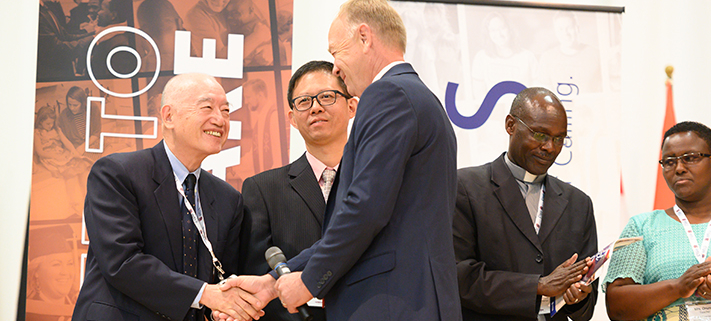Teen Talk: Jesus is our home
No matter how we feel about our home on this earth, we have an eternal home in heaven waiting for us.
Lydia Buxa
When I was younger, my dad was in the Coast Guard, so we moved around a lot. Every three years, he would be re-stationed to a different state, usually across the country. I lived in four different states and moved three times before fifth grade.
One summer, my dad retired and, wanting to be closer to family, we moved from California to Wisconsin. It was our final cross-country move. But I found myself missing my old home, which was over 2,000 miles away.
It took me a long time to accept my new house and school. For a while, I didn’t feel I belonged here. Every time I thought of going home, I thought of a completely different house. Some days, I still find myself wanting to go back to California.
Yet I have grown to love my new house. It is my retreat. To me, it’s the most comforting place on earth. During school, what gets me through some days is the fact that I get to go home later. Sometimes trying to wait until the end of the day so I can leave is an excruciating wait.
On earth, Christians stand out because of our faith, which leads us to act differently and can make us feel out of place. That’s when we feel a different kind of homesickness. It’s not for a house in a state thousands of miles away. It’s a homesickness for a place where we feel we really belong. We want to go to the perfect retreat that Jesus prepared for us. “We know that if the earthly tent we live in is destroyed, we have a building from God, an eternal house in heaven” (2 Corinthians 5:1).
No matter how often or rarely our earthly home changes, we look forward to going to heaven, the place that is our eternal home. That’s where we will meet Jesus. In him, and him alone, we find complete rest. It’s the one place where we’ll never have to say good–bye again. We will be eternal residents. “Our citizenship is in heaven. And we eagerly await a Savior from there, the Lord Jesus Christ, who . . . will transform our lowly bodies so that they will be like his glorious body” (Philippians 3:20,21).
Even though heaven is waiting for us, there are still tough days to get through. We miss just being home, and it’s an excruciating wait to get there. Jesus is with us and helps us get through these days. “The LORD himself goes before you and will be with you; he will never leave you nor forsake you. Do not be afraid; do not be discouraged” (Deuteronomy 31:8).
So, if you, like me, really miss your home or feel out of place, remember our real home is with Jesus. No matter how far away we live from the place we call “home,” Jesus is always right beside us, guiding and protecting us. And when Jesus takes us to heaven, we will confidently say, “I’m home.” I personally can’t wait to go.
The words of the famous hymn perfectly capture this:
“What though the tempest rage, Heav’n is my home.
Short is my pilgrimage; Heav’n is my home.
And time’s wild, wintry blast Soon shall be overpast;
I shall reach home at last; Heav’n is my home” (Christian Worship 417:2).
Lydia Buxa, a junior at Lakeside Lutheran High School, Lake Mills, Wisconsin, is a member at Immanuel, Farmington, Wisconsin.
SUBMIT YOUR STORY
Do you have a manuscript, idea, or story from your own life you’d like to share for use in Forward in Christ or on wels.net? Use our online form to share it to our editorial office for consideration.
SUBSCRIBE TO FORWARD IN CHRIST
Get inspirational stories, spiritual help, and synod news from Forward in Christ every month. Print and digital subscriptions are available from Northwestern Publishing House.
Author: Lydia Buxa
Volume 106, Number 10
Issue: October 2019
Copyrighted by WELS Forward in Christ © 2021
Forward in Christ grants permission for any original article (not a reprint) to be printed for use in a WELS church, school, or organization, provided that it is distributed free and indicate Forward in Christ as the source. Images may not be reproduced except in the context of its article. Contact us









